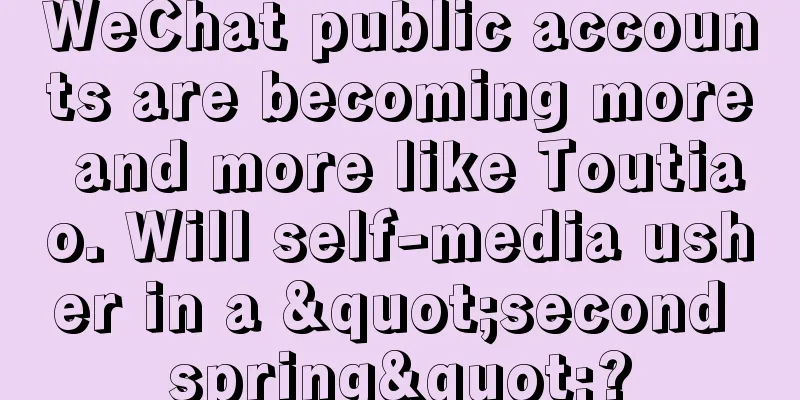WeChat public accounts are becoming more and more like Toutiao. Will self-media usher in a "second spring"?

Life will always find a way out. When the dividends of WeChat public accounts disappeared, practitioners quickly looked for opportunities on Douyin, Kuaishou, and Xiaohongshu. Those who did not find a way out either changed their careers or simply stopped updating. The glorious period of WeChat public accounts has been completely left in the past. Now everyone is studying the practices and operation strategies of Douyin, Kuaishou, and Xiaohongshu, and no one is thinking and studying how to do WeChat public accounts. Are WeChat public accounts completely wiped out? Not necessarily. The basics of WeChat public accounts are: 1. It still parasitizes on WeChat. The financial report shows that as of December 31, 2023, the number of monthly active accounts of WeChat and WeChat combined is 1.343 billion. It has two important positions on WeChat, one is "Subscription Account Messages" and the other is "Take a Look" in the Discover section. 2. The number of registered WeChat public accounts exceeds 30 million, and the number of accounts updated daily is in the millions. In other words, although the influence and trust of WeChat public accounts have been greatly reduced, it is still a huge traffic platform, and self-media still have the opportunity to write popular content. Zhang Xiaolong, the "Father of WeChat," once mentioned the issue of information flow at the WeChat Open Class in 2018: "In fact, we didn't think about (doing information flow), and I myself didn't even know what the so-called information flow was. A subscription account is a collection. We have thought about improving reading efficiency, which is different from information flow. It will only improve reading efficiency, and you can 'take a look' at the information flow." The background at that time was that almost all content platforms, such as Toutiao, Baidu, Sohu, NetEase, etc., began to adopt information flow-style personalized recommendations, and only WeChat public accounts adopted fixed subscription-style push. However, not long after Zhang Xiaolong said "I never thought about doing the information flow model", WeChat official accounts quietly changed their display format and gradually moved towards a personalized recommendation model. This quiet change did not cause much repercussions at the beginning. This has a lot to do with the sudden decrease in the number of researchers on WeChat official accounts. In the past, when WeChat official accounts were popular, a large number of accounts would act as "megaphones" for various changes and updates to WeChat official accounts to help amplify their voices, but now no one is studying the changes in WeChat official accounts, so naturally no one will care about the quiet changes in WeChat official accounts . The rapid departure of content creators from WeChat official accounts is closely related to the original design of WeChat official accounts. Zhang Xiaolong once said, "We also encourage all merchants or third-party service providers to organize various resources through the public platform." WeChat official accounts do not have a platform "operator" (in fact, there was a short-term one, but it did not continue to follow up), while platforms such as Toutiao, Baidu, Douyin, and Xiaohongshu all have platform operators who connect with creators, which greatly enhances the stickiness between creators and platforms. The Buddhist operation of WeChat official accounts is helpless in the face of the departure of creators, and another part of the creators quietly stop updating after seeing that there is no chance for WeChat official accounts. According to Guo Jing's observations in the Internet circle, the self-media accounts that used to update daily on WeChat official accounts have now become monthly or even annual updates. The implicit trend of WeChat official accounts stopping updates has led to a reduction in the total amount of the entire content library, which in turn has led to another transformation of WeChat official accounts, namely, the comprehensive "Toutiaoization" . The proportion of personalized recommended readings far exceeds that of subscription accounts. Users will find more and more messages from accounts they have not subscribed to in the information flow of "Subscription Account Messages", which come from system recommendations. WeChat public accounts have finally embarked on the path of "personalized recommended reading". Will the comprehensive "Toutiaoization" of WeChat public accounts usher in a "second spring" for self-media? 1. New changes in WeChat official accountsRecently, more than one friend told me that the number of followers and article readings on his WeChat public account suddenly increased. What is the reason behind this? Did someone else forward his article in the circle of friends? Or did the platform "send him warmth" and directly give him reading volume and followers? In fact, none of them. According to Guo Jing's observations in the Internet circle, new changes have occurred in WeChat public accounts: 1. Breaking the timeline limit . The feed of "Subscription Account Messages" is no longer displayed to users in a strict timeline format. The closer the time is to the present, the higher the display will be. The specific recommendation logic may be related to the user's usual reading habits. This is also the case on content platforms such as Toutiao, NetEase, and Weibo. Users are likely to browse news content from a few days ago. 2. The proportion of recommendations has greatly increased . In the past, if a WeChat public account wanted to have high traffic, it had to rely on having many fans and being able to push to many people, forwarding and sharing, and reading by friends in WeChat Moments. If you don’t have enough fans, you’ll lose the chance to become a “hot item” from the beginning. After the proportion of recommendations increases, the implicit constraints formed by the above three factors no longer exist, and now anyone can create a "hot item". Judging from the data of my recent articles, the highest proportion of recommendations can reach 46.33%. A friend's account has only a few thousand followers, but the number of readings of his three recent articles has reached nearly 10,000. Another friend said that the number of readings of one of his old articles suddenly increased significantly. An article I published on February 21, 2024 is still read nearly 100 times a day. 3. WeChat search traffic has started to rise . The WeChat public account backend now pushes the "Creator Weekly Report" to users on a weekly basis. The weekly report data shows the traffic brought by WeChat search in the past week. 4. Different “Take a look” options. In the “Take a look” option on the discovery page, the content recommended to users by the system is highly social. For example, content that has been read by “XXX brother’s friend” and other WeChat friends will be displayed first. This button is located at the bottom of the WeChat public account content page, along with “Like”, “Collect”, and “Share”. Next is “Accounts I often read”, “Accounts followed by XXX friends”, and accounts that have been followed. The "Subscription Account Messages" section is usually located below the subscribed accounts. For example, if you have subscribed to 50 accounts, when all the new messages of these 50 accounts have been displayed, the feed flow below is to take a look at the content. There will be content such as "Shared by XXX friends" and "Liked by XXX friends". Of course, there will also be information of completely unfamiliar accounts. The above changes to WeChat official accounts are a complete reshuffle of the entire content ecosystem. This change in ranking and recommendation format is a new wave of traffic opportunities. Unfortunately, WeChat official accounts are not well-known now, so no one interprets the opportunities brought by the new changes. 2. Operational strategy after re-orderingAnyone who has worked in SEO (search engine optimization) in the past will know that every time Baidu updates its ranking algorithm, website operators need to arrange new optimization methods. After all, if they can rank in the top three on the homepage, they can get a lot of free natural traffic. The same logic applies to WeChat public account operators. New article rankings require new operation strategies, and they need to decide what to focus on and what not to focus on. 1. Small accounts have opportunities . In the past, the ranking of WeChat public accounts was closely related to the number of followers. It was difficult for an account with less than 10,000 followers to do well. However, under the new ranking rules, it doesn’t matter if you have a small number of followers. You can still have the opportunity to stand out. The reading volume of small accounts will not be worse. On the contrary, under the new rules, it can increase from hundreds to thousands, or even tens of thousands, and the account content will have more opportunities to be pushed. 2. The title is more important than the content quality itself . Some people may say, hasn’t the title party always been there? Or isn’t it a common operation method to pay attention to the title? Actually, it is not. The "title party" has changed a long time ago. Just like Toutiao, Baidu, Sohu, NetEase, etc., the "title party" that was popular in a certain period of time may be cleared by the system after a while. If you use titles such as "Shocking" and "Just now...", you will become a clear target of crackdown. At this time, if you use such titles again, it will be counterproductive. Not only will it not be popular, but it will be restricted by the platform. After WeChat public accounts became personalized recommendations, they inevitably fell into the trap of "clickbait", with the importance of titles even greater than the content itself . One of my "small-time" articles is a typical Internet comment, and many users may not "understand" it, but the title of this article is quite special, which leads to a steady stream of users being attracted to it. A friend of mine recently published a popular article that has become popular. The title is also very prominent, and the content is also incomprehensible to ordinary users, but it has become popular. Users who read the article only look at the title and do not care about the content. The titles that made Mimi Meng popular in the past may not be popular now, because those titles are too "niche". Today's "title parties" are more suitable for content such as news clients and search engines, that is, content on major hot search lists. Titles related to these hot search lists will have more traffic. Another trick is that some Z-type accounts use very trendy headlines with all kinds of exclamation marks, but they don’t tell you what the content is. If you want to know what happened, you can only click on the content. I have to say that they really understand the algorithm thoroughly. It looks vulgar, but it is very effective. 3. The platform is big, and the "I" gradually disappears . In the "algorithm is king" model, any content must consider its value to the platform. The slogan of WeChat public accounts is: "No matter how small an individual is, he or she has his or her own brand." At the beginning, self-media also operated according to this model. Many self-media accounts have very strong "I" individual labels. If you are a so-called "die-hard fan", you can tell at a glance that this is an article in someone's style. However, this type of article with a strong personal style is completely different from the algorithm. The algorithm pursues good-looking data, and articles with a strong personal style are difficult to become popular just by the content itself. The current WeChat public account platform environment is that the platform is big and the "I" gradually disappears. The platform wants traffic, forwarding, and retention. This implicit KPI will make all content tend to be "hot search". If the self-media writes about hot topics, the traffic will be high. Otherwise, the data will not look particularly good. Nowadays, the popular articles on WeChat public accounts are not because of their good quality, but because the titles of the articles cater to the algorithm, and the content makes the likes, views, comments and other data look good, so the traffic will be pushed higher and higher. In the final analysis, it is the victory of the platform and the algorithm, and it has little to do with the personal IP of the content creator. The "100,000+" is not yours, but belongs to the platform. You are the "nutrient" of the platform. As a content creator, do you feel sad? I can only say that this is the situation. From the user's perspective, they will develop aesthetic fatigue for content with a strong personal style. In addition, as their personal cognition grows, they will also lose their sense of "authority" of WeChat public accounts. After all, users' acquisition and absorption of information are diversified, and it may not be a big deal to follow the algorithm. Just like Toutiao, NetEase, Baidu and other platforms, users may read a certain "explosive" article, but ignore who is the creator behind the content. 4. Pay attention to the value of user interaction . Each different content platform will have different focuses. For example, some platforms pay attention to the number of likes, some platforms pay attention to the number of comments and replies, and some platforms pay attention to the completion rate. The new rules of WeChat public accounts also increase the weight of user interaction, such as sharing, watching, liking, and leaving messages. In the past, the media attributes of WeChat public accounts did not pay much attention to user interaction, but under the personalized recommendation algorithm, user interaction has become one of the indicators of whether the platform recommends. For self-media, the tips for improving interaction that you have learned on platforms such as Xiaohongshu, Douyin, and Kuaishou can also be used on WeChat public accounts. Although WeChat official accounts do not have a dedicated content operation team, it does not mean that they are not concerned about the activity of the platform. WeChat has recently quietly opened the message function to some WeChat official accounts. This function was once closed until recently. In addition, WeChat official accounts have also cancelled the minimum 300-word limit for original content. It seems that WeChat official accounts have also made great efforts to encourage people to update their articles. The "second spring" of the entire self-media industry may be a joke. But for small personal self-media, perhaps, it can be a small explosion, and traffic is still valuable in the Internet industry. Now, as long as you update on WeChat public accounts, you have won a lot of people. Author: Guo Jing, WeChat public account: Guo Jing's Internet Circle |
<<: With 1.3 billion users as a base, can Video Account become the "catfish" of local life?
Recommend
The Father's Day copy you want is here!
The author of this article has prepared a special ...
Do shein's suppliers make money? What are the requirements for shein suppliers?
Shein has a large number of suppliers around the w...
With revenue of 10 billion yuan, private domain turnover will account for more than 20%. How does Anta plan its private domain?
As the cost of public domain traffic continues to ...
Can Amazon SKU be modified? What are the methods to modify it?
After we open a store on Amazon, we need to upload...
What causes low Amazon product ratings? How to avoid them?
On the Amazon platform, there are many products wh...
Who is driving the popularity of Zibo barbecue?
Zibo barbecue has become a new top food in the foo...
How to use shopeeSpayLater? What is the method?
On the Shopee platform, many buyers want to experi...
eBay Canada adjusts fees for selling sneakers
eBay Canada recently announced that eBay is adjust...
How to sell products on Xiaohongshu
This article will explore Xiaohongshu's sales ...
A dance video has received tens of millions of likes. Can Xue Baobao become the next Zhong Meimei?
This article starts with the recently popular Douy...
Introduction to Shopee Thailand Site 8.15 Big Promotion
Shopee Thailand’s 8.15 promotion has just been lau...
What is management? I rethought this question after starting my own business.
This article explores the relationship between man...
The cost of advertising on Xiaohongshu is getting higher and higher. How to grow in a muscle-like way?
It is increasingly difficult for merchants to star...
Amazon store naming tips, more fashionable cross-border e-commerce names
A good store name can make you stand out from your...
Behind Zheng Qinwen's gold medal at the Paris Olympics: some of the cooperating brands made a lot of money, while others fell silent
Zheng Qinwen won the women's singles tennis fi...






![6 popular article templates on Xiaohongshu|Just follow them [Industry templates V3.1]](/upload/images/67e6f50586b58.webp)


